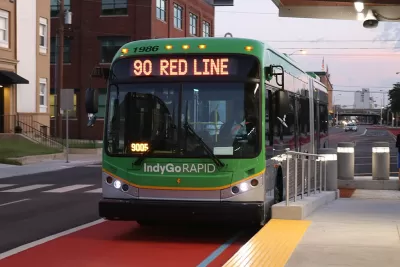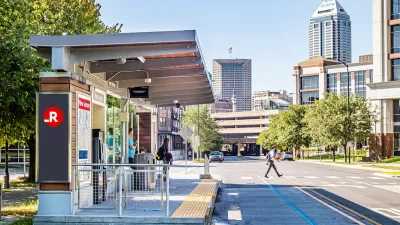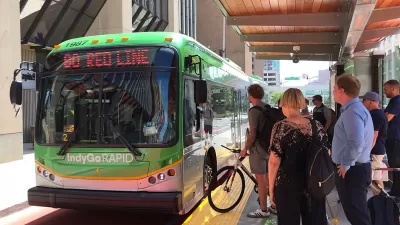The proposed legislation would impact the construction of planned IndyGo Blue Line, the third phase of the city’s bus rapid transit system.

Indiana lawmakers heard testimony this week on a bill that would prohibit public transportation projects from including dedicated transit lanes, according to Indiana news outlet Fox 59. Senate Bill 52 was introduced in January for consideration in the 2024 legislative session, but efforts to pass similar legislation go back as far as 2022. According to the bill, the prohibition would only be through July 2025.
As previously reported by Fox 59, critics of the bill like State Senator Andrea Hunley say it is obviously part of a campaign against the IndyGo Blue Line in Indianapolis, “a project years in the making.” The 24.5-mile-long Blue Line, the third phase of IndyGo’s bus rapid transit system connecting Cumberland on the east with the Indianapolis International Airport on the west side of the city, has been delayed since May 2022 when the project estimate came in far above than expected. IndyGo currently has the Blue Line’s opening set for 2027.
After more than three hours of testimony, the Indiana House Committee on Roads and Transportation opted to hold the bill for next week, which opens the opportunity for the committee to debate amendments and potentially vote on the measure, writes Fox 59 reporter David Gay.
Objectors to the bill testified that dedicated transit lanes would result in more reliable bus service and more safety for people who walk along busy streets. Meanwhile, some business owners along the proposed Blue Line route were in favor of the measure, expressing concern that reducing the number of lanes on the streets in front of their locations would negatively impact their revenue and lower property values.
FULL STORY: Indiana House Committee on Roads, Transportation hears 3+ hours of testimony on Senate Bill 52

Trump Administration Could Effectively End Housing Voucher Program
Federal officials are eyeing major cuts to the Section 8 program that helps millions of low-income households pay rent.

Planetizen Federal Action Tracker
A weekly monitor of how Trump’s orders and actions are impacting planners and planning in America.

Ken Jennings Launches Transit Web Series
The Jeopardy champ wants you to ride public transit.

Washington Legislature Passes Rent Increase Cap
A bill that caps rent increases at 7 percent plus inflation is headed to the governor’s desk.

From Planning to Action: How LA County Is Rethinking Climate Resilience
Chief Sustainability Officer Rita Kampalath outlines the County’s shift from planning to implementation in its climate resilience efforts, emphasizing cross-departmental coordination, updated recovery strategies, and the need for flexible funding.

New Mexico Aging Department Commits to Helping Seniors Age ‘In Place’ and ‘Autonomously’ in New Draft Plan
As New Mexico’s population of seniors continues to grow, the state’s aging department is proposing expanded initiatives to help seniors maintain their autonomy while also supporting family caregivers.
Urban Design for Planners 1: Software Tools
This six-course series explores essential urban design concepts using open source software and equips planners with the tools they need to participate fully in the urban design process.
Planning for Universal Design
Learn the tools for implementing Universal Design in planning regulations.
Heyer Gruel & Associates PA
Ada County Highway District
Institute for Housing and Urban Development Studies (IHS)
City of Grandview
Harvard GSD Executive Education
Toledo-Lucas County Plan Commissions
Salt Lake City
NYU Wagner Graduate School of Public Service




























